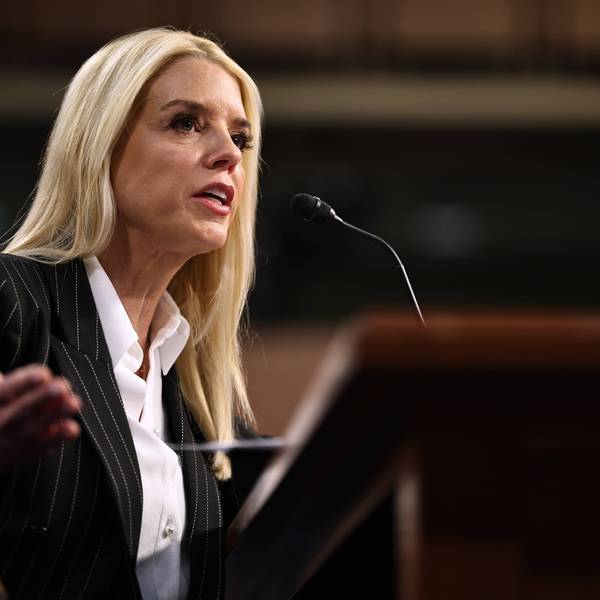On June 23, the White House told Democratic leaders in Kentucky that they would nominate to a lifetime position as a federal judge Chad Meredith, a Republican lawyer who has defended anti-abortion laws. But the White House postponed the announcement, set for the following day, because it was the day the U.S. Supreme Court overturned Roe v. Wade, ending the constitutional right to an abortion.
When the Louisville Courier-Journal leaked the news of President Biden's plans to nominate Meredith, progressives and reproductive rights advocates responded with outrage. A coalition of major abortion rights organizations including the Planned Parenthood Federation of America and NARAL Pro-Choice America released a statement blasting the nomination of Meredith, who helped successfully defend an anti-abortion law while previously serving as solicitor general for Kentucky's current Attorney General Daniel Cameron, a Republican.
"This is unacceptable at any time, but especially on the heels of six Supreme Court justices taking away a fundamental right from millions of people," the statement said.
Last week, however, the White House changed its mind about Meredith -- though not because of opposition from the left. It changed course because the White House is adhering to the "blue slip" tradition of deferring to senators on judicial nominees in their states, and Republican Sen. Rand Paul of Kentucky objected to Meredith. Paul complained that Senate Minority Leader Mitch McConnell, his fellow Kentuckian, had a "secret deal" with Biden and hadn't consulted him on the nominee.
Several media reports suggested that the Meredith nomination was part of a deal with McConnell to avoid obstruction of other nominees to judgeships or federal prosecutor positions. But McConnell recently told the New York Times that there was no deal, and that the nomination of Meredith was "a personal friendship gesture" from Biden.
While Kentucky Right to Life, an anti-abortion group, had praised Meredith and his work to make abortion less accessible, several Democratic senators had announced that they would oppose the nominee. Sen. Tim Kaine of Virginia, for example, said Meredith wasn't "the kind of person that a Democratic majority should put on the bench."
Former President Donald Trump considered Meredith for a judgeship in 2019 but didn't push the nomination forward. While Trump was considering him, documents emerged that showed how as chief deputy general counsel for former Kentucky Gov. Matt Bevin (R), Meredith was involved in controversial pardons, including one for a convicted murderer whose family had contributed to Bevin's campaign.
Like other judges nominated by Trump and Republican governors around the country, Meredith is active in the conservative Federalist Society. He clerked for Judge Amul Thapar, a Trump appointee who recently ordered the state of Ohio to adopt election districts that violate the state constitution.
Why honor a Jim Crow practice?
The tradition that gives senators a veto over judicial nominations in their states has its roots in the segregated South.
The Nation's justice correspondent Elie Mystal wrote last year that "blue slips were invented by Mississippi Senator James Eastland ... to give segregationist senators a tool for blocking judges who would enforce desegregation. They are literally a Jim Crow idea." Mystal notes that when Trump was in office, Republican senators abandoned the blue slip rule for appellate court judges. This allowed Republicans to install a record number of judges, reshaping the judiciary and pushing it to the right.
When Democrats took over the U.S. Senate after Georgia's 2020-2021 special election, they continued to honor the blue slip rule for lower court nominees. This has left Republican senators in Southern states with a veto over nominations to trial court judgeships -- and a judiciary with a vacancy crisis. More than 120 seats on the federal judiciary are now vacant, and there's no nominee pending for half of them.
Dozens of progressive organizations recently called on the White House to pick up the pace of filling vacancies. They noted that, at the current pace of confirmations, more than 60 vacancies would be left at the end of the year. And it's possible that Republicans will control the Senate after this year's election.
Biden has nominated a demographically diverse slate of judges -- including former public defenders -- to courts around the country, but he hasn't nominated many of those judges in the South. The exceptions are in Virginia and Georgia, which are the only Southern states with Democratic senators. Civil rights lawyer Nancy Abudu, who has worked to defend voting rights and abortion access, could soon be confirmed to the 11th Circuit Court of Appeals in Atlanta. And last week, Biden nominated to a judicial opening in Virginia Jamar Walker, who could become the first openly LGBTQ judge in the state.
Biden is reshaping courts in other parts of the country with judges who have worked to defend civil rights. If he would abandon the blue slip tradition, he could also reshape the federal judiciary throughout the South.




